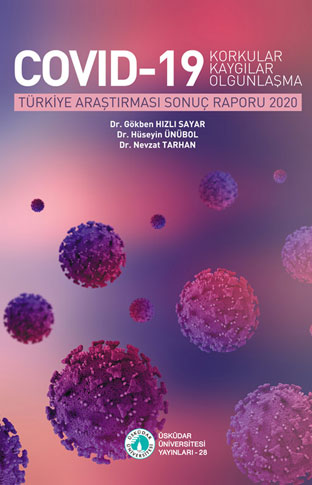COVID – 19 FEARS, ANXIETIES, MATURATION Turkey Research Results Report 2020
There is a shocking truth that everyone agrees on today, which is that the Covit-19 epidemic in 2020 will cause a fundamental change. Fear has taken over our lives, and it has gone down in history with its widespread impact, mysterious nature, and the sense of danger it evokes.
This was a biological disaster, but it was different from others. In other natural disasters, such as earthquakes, hurricanes, and floods, the place and time were specific. However, the coronavirus epidemic had an uncertain place and time as a natural disaster. The sense of uncertainty it evoked greatly increased fear. Feelings of helplessness, loneliness, powerlessness, being besieged, and urgency were experienced simultaneously.
As the world was going through a psychosocial experiment, we, as a university, wanted to touch upon the psychology of the society and contribute to decision-makers in setting the right policies. The pandemic disrupted five of our characteristics; it negatively affected our psychological well-being, our freedom, our physical comfort, and our social relationships, and we felt that death was near. However, it also gave us three gifts: free time, psychological resilience and endurance training, and an opportunity to rebuild the human and universal values we had abandoned. As the Üsküdar University Epidemiological Study Group, we quickly created the questions, tests, and surveys. We identified sub-factors in four main areas. The first is perceptions related to the process: questions about the treatability of the disease, how the public managed the process, and social perceptions regarding the working processes of healthcare professionals and scientific boards. The second aimed to measure anxieties related to the process. The third step evaluated fears and avoidances related to the process; these scales had important variable value in predicting the future. The fourth sub-factor aimed to measure participants' capacity for psychological maturation and growth from the process. We received interesting answers to the questions for this, which was very pleasing. We asked questions about progress in areas such as starting to appreciate what they have, increased strength to withstand difficulties, changes in importance and priorities, and valuing spiritual values more. You will find the results of the 56-question online evaluation surveys and scales applied to 6318 people in the following pages while creating the database. The sample had a high degree of representativeness and could cover all regions of Turkey.
The creation of scales, their application, data collection, and subsequent analysis are processes that require great care. I sincerely congratulate the academics and administrative staff of the successfully working Epidemiological Study Group. Assoc. Prof. Dr. Gökben Hızlı Sayar and Dr. Lecturer Hüseyin Ünübol pioneered a study that will go down in history. I think the resulting database will be much talked about.
Prof. Dr. Nevzat Tarhan
Publication date: 2020
ISBN: 978-605-9596-32-9
Number of prints: 1st Edition
Language: Turkish
Number of pages: 192
Publisher: Üsküdar University Publications - 28
Authors